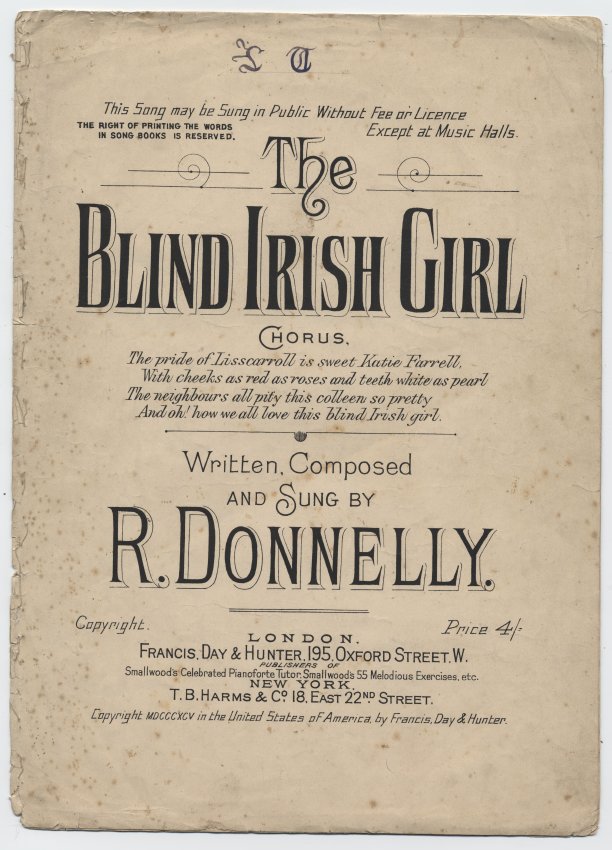Blind Irish girl, The
| AKA | Sweet Kitty Farrell Katie Farrell The pride of Liscarroll |
| First Published | 1895 |
| Writer/composer | Robert Donnelly | Roud | RN22769 |
| Music Hall Performers | Robert Donnelly |
| Folk performances | Collected from the singing of: Keeping family; England : London; 1930-50 Stewart, Lucy; Scotland : Aberdeenshire; 1960 Green, Harry; ngland : Essex : 1968 Graham, Mrs.; N. Ireland : Co. Antrim; 1969 Baker, Arthur; England : Hampshire; 1971 Ling, George; England : Surrey; 1971 Doherty, Bernard; Ireland : Co. Donegal; 1989 |
In my native home, Lisscarroll Lives a colleen who is blind And her name is Katie Farrell To her the neighbours all are kind To see her knit beside her mother You ne'er think her sight was gone And with Barney, her young brother She milks the cows at early dawn. The pride of Lisscarroll is sweet Katie Farrell With cheeks as red as roses and teeth as white as pearl The neighbours all pity this colleen so pretty And, Oh how we all love this blind Irish girl. Years ago when she was courting Her young sweetheart, Ned Malloy One night they were both out walking With hearts like children full of joy A storm came on and Kate got frightened She seized the arm of sweetheart Ned When both of them were struck by lightning They found her blind, and he was dead. What a sad and awful ending Just when everything seemd bright For her to lose her future husband And she, poor girl, to lose her sight All the neighbours gathered round her One and all to her were kind And the reason... her affliction They pitied her, for she was blind.

An early song composed written and performed by Robert Donnelly, who started his professional life as a performer but became a full time songwriter in the late 1890s. Donnelly specialised in writing sentimental and Irish songs – this song covers both themes.
The Blind Irish Girl was printed in several broadsides and cheap 2oth century songbooks. It was widely sung by amateur performers in Ireland and the UK form 1896 on, and seems to have been sung regularly ever since.
You can here a lovely version at the Irish Traditional Music Archive sung by Bernard Doherty of the Innishowen Traditional Singers’ Circle.
Another interesting version was collected from the singing of John McCrory when he was held as a prisoner of war in a German POW camp during the First World War. You can here a digitally enhanced version made by The Irish Times via this SoundCloud Widget and read more of his story on this BBC website.
Sources:
- Entries in the Roud Indexes at the Vaughn Williams Memorial Library: https://archives.vwml.org/search/all:single[folksong-broadside-books]/0_50/all/score_desc/extended-roudNo_tr%3A22769
- Kilgarrif Sing Us
- Lyrics: monologues.co.uk
- Sheet Music (cover only) Courtesy of the Irish Fest Collection, Ward Irish Sheet Music Archives, Milwaukee Irish Fest.
- Mudcat thread